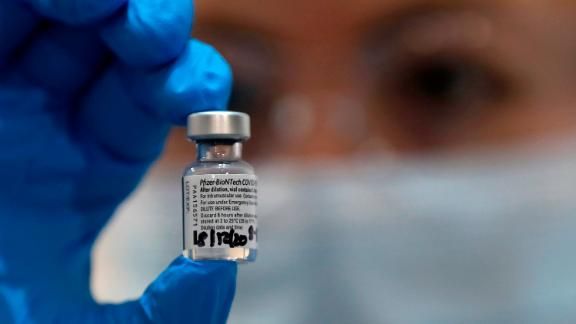Local and national health officials answer COVID-19 vaccine questions

(KION) The first round of COVID-19 vaccines are being distributed and administered Monday after Pfizer-BioNTech's shot received authorization.
Vaccines are expected to get to the Central Coast Tuesday or Wednesday.
This first round is just for health care and nursing home workers, but eventually, the vaccine will be opened up to the public. Central Coast health officials anticipate that will happen sometime in spring or summer of next year.
“Getting vaccinated is going to be the fastest and safest way for us to get to some herd immunity and bring this pandemic to an end,” said Dr. Martha with Community Hospital of the Monterey Peninsula.
When are Central Coast hospitals expecting to starting vaccinations? CHOMP plans to start vaccinating as soon as the shots arrive. A Salinas Valley Memorial Hospital spokesperson says they have been told the vaccine batch could arrive "late" this week, hopefully Thursday.
Plans are also underway to start administering the vaccines in Santa Cruz on Thursday.
“They’re going to be offered to the highest risk frontline workers. It is not going to be mandatory but we’re happy that so many of our employees and medical staff are anxious to get vaccinated,” Dr. Blum said.
Santa Cruz Deputy Health Officer Dr. David Ghilarducci said they expect about 10-15 percent of health care workers to get vaccinated in the first round of the Pfizer vaccine.
They expect more rounds each week and later anticipate more doses once the Moderna vaccine comes out. By end of January, the department is expecting almost all health care workers to be vaccinated.
Monterey County is set to receive 3,000 doses, Santa Cruz County will receive 1,950 and San Benito County will receive 350. Officials expect that at least one COVID-19 vaccine will be authorized before the end of the year.
However, KION learns Mee Memorial is not going to be receiving any doses from the first batch of the Pfizer vaccine. They expect to receive the Moderna vaccine, still awaiting FDA approval, in about a week.
But you might still have questions about the vaccine. KION spoke with local and state health officials to get some answers.
Is the vaccine safe?
Dr. Blum said the vaccine is safe and effective, and she hasn’t heard many reports of adverse side effects.
We asked local health officials if they plan to get the vaccine once it's available:
“As soon as it’s my turn, I’m going to get vaccinated,” Blum said.
“I’m going to do it. I’m going to recommend it to my entire family, to my mother, to my sister and every body because I do believe it’s safe. It’s been tested on 40,000 people already, the Pfizer,” Dr. Ghilarducci said.
Are there side effects?
Health experts said there are side effects, but that is expected and actually shows that the vaccine is working. According to the CDC, there are two types of common side effects, including pain and swelling in the arm where you got the shot or flu-like symptoms, including fever, chills, tiredness or headache.
How is the shot administered?
According to the CDC, you will need two shots for most COVID-19 vaccines to work. They are typically administered 21 days apart. It may take a week or two after your second shot for your body to build protection.
How much does it cost to get vaccinated?
The California Department of Public Health told KION the COVID-19 vaccine is available to Californians at no cost. Even those who are uninsured can get vaccinated.
Dr. Ghilarducci said there are some independently funded companies that may charge for the vaccine, but at this point, there is no cost to anybody to get the vaccine.
How long is the vaccine supposed to be effective?
Because the vaccine came out so quickly, local health officials don’t yet know how long it will last or if it can prevent the virus from being transmitted from person to person.
"We're not really sure how long the vaccine immunity is going to last. The estimates are that it would be at least a year, so we're just going to have to wait for a little more time to pass for us to get more long term data from those research studies," Dr. Blum said.
“We know that 95 percent of folks will be protected from the ill effects of the vaccine but we don’t know if the vaccine is going to prevent spread so that’s where herd immunity is so important,” Dr. Ghilarducci said.
Will I still need to wear a mask if I get vaccinated?
Local health officials say it’s important to wear a mask and continue following guidelines even after getting the vaccine. The CDC said that the combination of getting vaccinated and following health guidelines will offer the best protection from COVID-19.
"They're very effective, up to 95 percent effective in preventing people from getting disease, but what we don't know is whether or not they will prevent the virus from being transmitted from person to person so it's still going to be important for everyone to wear the mask and keep distance and keep their hands clean while we're waiting for the vaccine to be rolled out over the coming months," Dr. Blum said.
What does the vaccine do?
The COVID-19 vaccine will help protect you by creating an antibody response without having to experience sickness, according to the CDC. Health experts said it reduces severe illness and symptomatic illness, but it hasn't been shown to reduce the spread of the coronavirus or transmission.
"Getting COVID-19 may offer some natural protection, known as immunity. But experts don’t know how long this protection lasts, and the risk of severe illness and death from COVID-19 far outweighs any benefits of natural immunity. COVID-19 vaccination will help protect you by creating an antibody response without having to experience sickness," according to the CDC's COVID-19 webpage.
Click here for more information about vaccine benefits from the CDC: https://www.cdc.gov/coronavirus/2019-ncov/vaccines/vaccine-benefits.html?CDC_AA_refVal=https%3A%2F%2Fwww.cdc.gov%2Fcoronavirus%2F2019-ncov%2Fvaccines%2Fabout-vaccines%2Fvaccine-benefits.html
